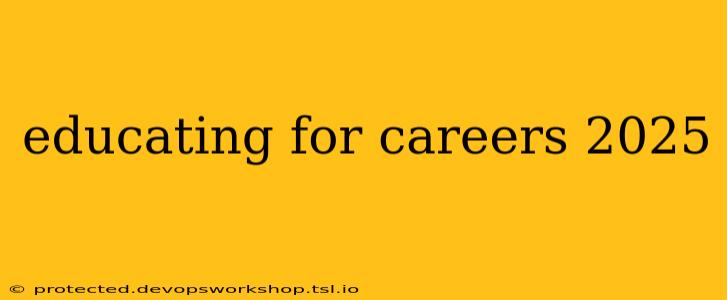The landscape of work is changing at an unprecedented pace. To ensure students thrive in the job market of 2025 and beyond, education must evolve to meet the demands of a rapidly transforming economy. This means moving beyond traditional rote learning and embracing a more holistic, future-focused approach. This article explores the key shifts needed in education to effectively prepare students for the careers of tomorrow.
The Shifting Sands of the Job Market: Understanding the Future of Work
The future of work is characterized by several key trends:
- Automation and AI: Automation is rapidly transforming industries, displacing some roles while creating new ones requiring advanced technological skills. Understanding AI, machine learning, and data analysis will be crucial for many future careers.
- The Gig Economy: The rise of the gig economy means that traditional full-time employment is becoming less prevalent. Students need to develop skills in self-management, entrepreneurship, and networking to navigate this flexible work landscape.
- Demand for Soft Skills: While technical skills remain important, soft skills such as communication, collaboration, critical thinking, problem-solving, and adaptability are increasingly valued by employers. These skills are transferable across various industries and roles.
- Emphasis on Lifelong Learning: Continuous learning and upskilling will be essential to remain competitive in a constantly evolving job market. Students need to develop a growth mindset and a passion for lifelong learning.
- Globalized Workforce: The increasing interconnectedness of the global economy requires students to develop intercultural communication skills and a global perspective.
Reimagining Education: Key Strategies for Career Readiness in 2025
To effectively prepare students for these changes, educational institutions must adopt several key strategies:
1. Integrating Technology and Digital Literacy:
- Coding and Programming: Introducing coding and programming from a young age fosters computational thinking and prepares students for roles in technology and other fields.
- Data Literacy: Equipping students with the skills to analyze and interpret data is crucial in today's data-driven world.
- Digital Citizenship: Educating students about responsible technology use, online safety, and ethical considerations in the digital age is paramount.
2. Fostering Essential Soft Skills:
- Project-Based Learning: Engaging students in project-based learning fosters collaboration, problem-solving, and critical thinking skills.
- Internships and Apprenticeships: Providing opportunities for real-world experience through internships and apprenticeships bridges the gap between education and employment.
- Mentorship Programs: Connecting students with mentors who can guide their career development provides invaluable insights and support.
3. Emphasizing Personalized Learning:
- Adaptive Learning Technologies: Utilizing adaptive learning platforms allows for personalized learning experiences tailored to each student's individual needs and pace.
- Career Counseling and Guidance: Providing comprehensive career counseling and guidance helps students explore their interests, identify career pathways, and develop a personalized career plan.
4. Cultivating a Growth Mindset and Lifelong Learning:
- Promoting Curiosity and Inquiry: Encouraging students to ask questions, explore their interests, and develop a passion for learning is essential.
- Developing Self-Directed Learning Skills: Equipping students with the skills to independently learn and adapt to new information is crucial for lifelong success.
5. Embracing Global Perspectives:
- International Collaboration: Encouraging international collaboration and exchange programs broadens students' perspectives and prepares them for a globalized workforce.
- Multilingual Education: Promoting multilingual education equips students with valuable communication skills in a globalized world.
Conclusion: Preparing for a Future of Opportunities
The future of work presents both challenges and opportunities. By embracing these strategies, educational institutions can empower students with the knowledge, skills, and mindset needed to not only navigate the complexities of the 2025 job market but also thrive and shape the future of work itself. The focus should shift from simply preparing students for existing jobs to equipping them with the adaptability and skills needed to create and excel in the jobs of tomorrow. This proactive approach is crucial for ensuring a skilled and resilient workforce for the years to come.

